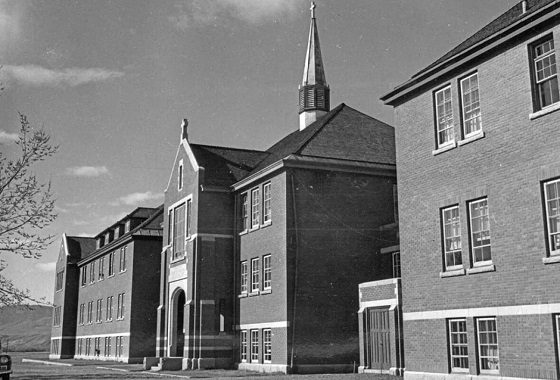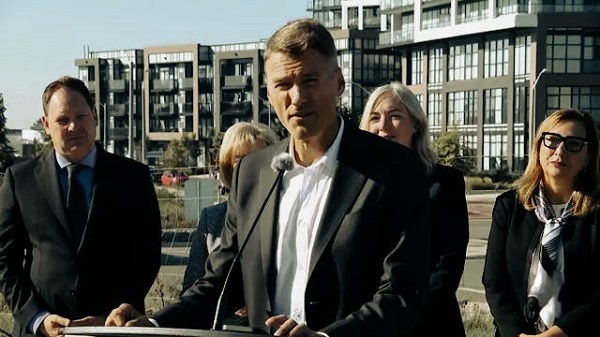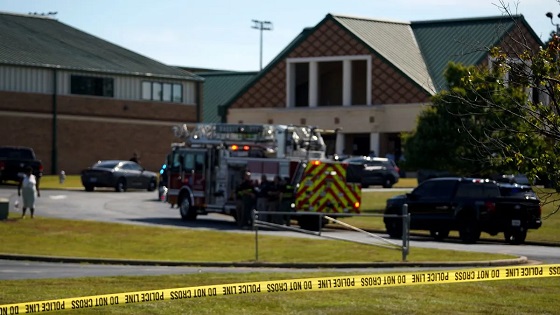Frontier Centre for Public Policy
Let’s get the facts on the graves, with a public inquiry

From the Frontier Centre for Public Policy
Canada needs a public inquiry into what has become known as “The Kamloops Graves Hoax”.
The May 27, 2021 claim of the Kamloops Indian band was that “human remains” were found in the apple orchard area of the former Kamloops Indian Residential School, resulting in what has been described both as a “national hysteria” and a “moral panic”. The band subsequently extended the claim to include other even more graphic terms, such as “bodies”, “graves” and even “mass graves”. Emotional articles and books followed.
In a press release issued three years after those sensational claims were made, their chief, Roseanne Casimir, has finally admitted the truth – there were no “human remains”, “bodies” “graves” or “mass graves” found at Kamloops.
Only “soil anomalies” were detected. Those anomalies could just as easily be tree roots, rocks, or the result of any of the other previous excavations that had been done in that same area. (As it happens there was a previous excavation in the area that was apparently missed by the radar operator. It is almost certain that it was soil anomalies from a 1924 excavation that her radar detected.)
Those 2021 false claims sent the nation into a panic. There is no need to describe in detail the flag-lowering, church-burning shock and frenzy that spread like wildfire through national and international media, brought the ailing Pope to Canada, convinced shamed MPs to condemn their own country as genocidal, vote in regressive UNDRIP and other incredibly expensive legislation, and spend what will be billions of dollars on a futile search for “missing children” who never existed. Many fine writers, including Terry Glavin, have described these strange last three years.
That episode of national hysteria is now an embarrassing part of Canada’s history.
A legitimate question to ask is why the Kamloops band made those false claims.
Chief Casimir said that they were based on Sarah Beaulieu’s report.
“But it would be shockingly unprofessional for a ground penetrating radar operator (GPR) to claim that graves had been found before excavation had taken place. It is well known that GPR can detect only soil anomalies or disturbances. It cannot detect “graves” or “human remains”. A simple Google search of the question “Can ground penetrating radar detect graves?” is all that is necessary to find that answer.
It therefore seems highly unlikely that Beaulieu would have made such a reckless claim. Almost certainly, Beaulieu properly reported only that soil disturbances, anomalies or reflections – that might be graves — were detected, and that excavation would be necessary to determine whether or not those disturbances were graves, or any of the hundreds of other possibilities.
But the answer to precisely what Beaulieu said can only be found by reading her report. And that is currently impossible, because the band is refusing to release the report. This is odd, because they had initially promised to release it, and only later reneged on that promise. They are are now steadfastly refusing to let the public see it.
The only reasonable explanation for this refusal is that they have something to hide – specifically that their claim of “graves” found was a claim they knew was false when they made it. Beaulieu’s report almost certainly did not say that graves had been found.
But on the strength of what appears to be a lie they made an application to the federal government for money to deal with what they said were “graves” containing the remains of 215 KIRS students – students they insisted had died under sinister circumstances, and were secretly buried by persons unknown, with the forced help of children – “as young as six”.
Exactly what representations the band made to the federal government in order to get the $8,000,000, or how the money was spent, is unknown, for the simple reason that both the band and the federal government have not released that information to the public.
Logic dictates that either Sarah Beaulieu, or Chief Roseanne Casimir, claimed that “graves” had been found, knowing that such information was false. Only one of them was telling the truth. $8,000,000 was obtained from the federal government on false information. Who made that false “grave” claim?
The Kamloops band refuses to release Beaulieu’s report – a report they initially promised to release. They are also refusing to provide any details about how the $8,000,000 was spent – despite not having put even one shovel in the ground. The RCMP is refusing to investigate anything involving the Kamloops claim, unless the Kamloops band requests their assistance. It is not likely that the band will ask the RCMP to investigate their own false claim. The federal government is refusing to release any details about the representations made by the band in order to obtain the $8,000,000.
And now, three years after that claim of “human remains” the Kamloops band has suddenly changed “remains” to exactly what they always were “anomalies”. They refuse to provide an explanation for that astounding reversal.
Meanwhile, there is absolutely no explanation from the Trudeau government about why they gave out millions of dollars of taxpayers’ money, and severely damaged Canada’s reputation at home and abroad, with a preposterous genocide confession, for allegations about secret graves that a simple Google search would have told them were false. There is also no explanation for the mainstream media’s failure to do that simple Google search, or ask even one obvious question about claims that were so highly improbable from the outset.
Hamlet’s “Something is rotten in the state of Denmark” quote is apt here.
Except the smell is coming straight from Kamloops and Ottawa.
Most Canadians now believe at least some version of the original claim that priests secretly buried indigenous children at Kamloops. One in five believe that priests actually murdered the children.
Life in Canada has been severely disrupted by the false claims made on May 27, 2021. Canada’s reputation has been badly damaged. Canadian schoolchildren are being falsely taught that their ancestors were genocidal racists.
We have now reached the absurd point where a Justice Minister of Canada has seriously considered criminalizing anyone asking legitimate questions about these secret burial claims, Canada’s Senate has recommended that even writing an article disputing the original May 27, 2021 Kamloops claim should be outlawed – apparently making not only this article – but even Casimir’s recent correction to “anomalies” illegal. This madness must end. Canadians deserve to know how things went so horribly wrong.
A public inquiry is the only way to clear the air, and get the country back on track.
Brian Giesbrecht, retired judge, is a senior fellow at the Frontier Centre for Public Policy.
Business
Major Projects Office Another Case Of Liberal Political Theatre

From the Frontier Centre for Public Policy
By Lee Harding
Ottawa’s Major Projects Office is a fix for a mess the Liberals created—where approval now hinges on politics, not merit.
They are repeating their same old tricks, dressing up political favouritism as progress instead of cutting barriers for everyone
On Sept. 11, the Prime Minister’s Office announced five projects being examined by its Major Projects Office, all with the potential to be fast-tracked for approval and to get financial help. However, no one should get too excited. This is only a bad effort at fixing what government wrecked.
During the Trudeau years, and since, the Liberals have created a regulatory environment so daunting that companies need a trump card to get anything done. That’s why the Major Projects Office (MPO) exists.
“The MPO will work to fast-track nation-building projects by streamlining regulatory assessment and approvals and helping to structure financing, in close partnership with provinces, territories, Indigenous Peoples and private investors,” explains a government press release.
Canadians must not be fooled. A better solution would be to create a regulatory and tax environment where these projects can meet market demand through private investment. We don’t have that in Canada, which is why money has fled the country and our GDP growth per capita is near zero.
Instead of this less politicized and more even-handed approach, the Liberals have found a way to make their cabinet the only gatekeepers able to usher someone past the impossible process they created. Then, having done so, they can brag about what “they” got done.
The Fraser Institute has called out this system for its potential to incentivize bribes and kickbacks. The Liberals have such a track record of handing out projects and even judicial positions to their friends that such scenarios become easier to believe. Innumerable business groups will be kissing up to the Liberals just to get anything major done.
The government has created the need for more of itself, and it is following up in every way it can. Already, the federal government has set up offices across Canada for people to apply for such projects. Really? Anyone with enough dollars to pursue a major project can fly to Ottawa to make their pitch.
No, this is as much about the show as it is about results—and probably much more. It is all too reminiscent of another big-sounding, mostly ineffective program the Liberal government rolled out in 2017. They announced a $950-million Innovation Superclusters Initiative “designed to help strengthen Canada’s most promising clusters … while positioning Canadian firms for global leadership.”
That program allowed any company in the world to participate, with winners getting matching dollars from taxpayers for their proposals. (But all for the good of Canada, we were told.) More than 50 applications were made for these sweepstakes, which included more than 1,000 businesses and 350 other participants. In Trudeau Liberal fashion, every applicant had to articulate how their proposal would increase female jobs and leadership and encourage diversity in the long term.
The entire process was like one big Dragon’s Den series. The Liberals trotted out a list of contestants full of nice-sounding possibilities, with maximum hype and minimal reality. Late in the process, Minister of Innovation, Science and Industry Navdeep Bains picked the nine finalists himself (all based in cities with a Liberal MP), from which five would be chosen.
The alleged premise was to leverage local and regional commercial clusters, but that soon proved ridiculous. The “Clean, Low-energy, Effective and Remediated Supercluster” purported to power clean growth in mining in Ontario, Quebec and Vancouver. Not to be outdone, the “Mobility Systems and Technologies for the 21st Century Supercluster” included all three of these locations, plus Atlantic Canada. They were only clustered by their tendency to vote Liberal.
Today, the MPO repeats this virtue-signalling, politicking, drawn-out, tax-dollar-spending drama. The Red Chris Mine expansion in northwest British Columbia is one of the proposals under consideration. It would be done in conjunction with the Indigenous Tahltan Nation and is supposed to reduce greenhouse gas emissions by 70 per cent. That’s right up the Liberal alley.
Meanwhile, the project is somehow part of a proposed Northwest Critical Conservation Corridor that would cordon off an area the size of Greece from development. Is this economic growth or economic prohibition? This approach is more like the United Nations’ Agenda 2030 than it is nation-building. And it is more like the World Economic Forum’s “stakeholder capitalism” approach than it is free enterprise.
At least there are two gems among the five proposals. One is to expand capacity at the Port of Montreal, and another is to expand the Canada LNG facility in Kitimat, B.C. Both have a market case and clear economic benefits.
Even here, Canadians must ask themselves, why must the government use a bulldozer to get past the red tape it created? Why not cut the tape for everyone? The Liberals deserve little credit for knocking down a door they barred themselves.
Lee Harding is a research fellow for the Frontier Centre for Public Policy.
Business
Finance Committee Recommendation To Revoke Charitable Status For Religion Short Sighted And Destructive

From the Frontier Centre for Public Policy
A new report from the Frontier Centre for Public Policy warns that proposed changes to Canada’s Income Tax Act could have devastating consequences for churches and faith-based organizations nationwide.
Revoking the Charitable Status for the Advancement of Religion: A Critical Assessment, by senior fellow Pierre Gilbert, responds to the 2025 Standing Committee on Finance’s recommendation to remove “advancement of religion” as a recognized charitable purpose.
If adopted, the measure could strip churches, mosques, synagogues, temples and religious charities of their charitable status. The impact would include the loss of income tax exemptions and the inability to issue charitable tax receipts. They could also face a one-time penalty tax that effectively wipes out most of what they own.
“The committee’s recommendation, driven by lobbying from the BC Humanist Association, represents a direct threat to religious freedom and the vital role faith communities play in Canadian society,” said Gilbert. “Religious organizations contribute an estimated $16.5 billion annually to Canada through social services, education, community programs and cultural preservation. Revoking their charitable status would be both fiscally shortsighted and socially destructive.”
The report traces the origins of charitable status in English common law, examines the rise of secularism and fiscal pressures driving the proposed change, and calls on churches to proactively respond through education, advocacy and reasserting their public mission.
Download full PDF here. (30 pages)
-

 Censorship Industrial Complex2 days ago
Censorship Industrial Complex2 days agoCanada’s privacy commissioner says he was not consulted on bill to ban dissidents from internet
-

 Business2 days ago
Business2 days agoFormer Trump Advisor Says US Must Stop UN ‘Net Zero’ Climate Tax On American Ships
-

 Alberta2 days ago
Alberta2 days agoEnbridge CEO says ‘there’s a good reason’ for Alberta to champion new oil pipeline
-

 Alberta2 days ago
Alberta2 days agoThe Technical Pitfalls and Political Perils of “Decarbonized” Oil
-

 National1 day ago
National1 day agoDemocracy Watch Renews Push for Independent Prosecutor in SNC-Lavalin Case
-

 Bruce Dowbiggin2 days ago
Bruce Dowbiggin2 days agoLong-Distance Field Goals Have Flipped The Field. Will The NFL Panic?
-

 Business2 days ago
Business2 days ago“Nation Building,” Liberal Style: We’re Fixing a Sewer, You’re Welcome, Canada
-

 Business1 day ago
Business1 day agoOver two thirds of Canadians say Ottawa should reduce size of federal bureaucracy






